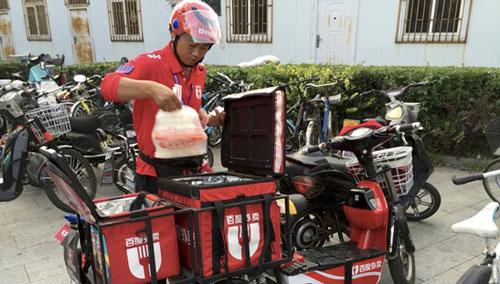


(File photo)
China's more than 400 million tons of annual household trash might be in danger of being overwhelmed by increasing takeout rubbish and improper waste disposal technology, experts have warned.
Of those waste, more than half originates with urban families, Liu Jianguo, a professor specializing in solid waste management at Tsinghua University, told the Global Times Monday.
"Over 60 percent of household rubbish ultimately ends up in the landfill and less than 40 percent is incinerated. A small portion is processed in biological waste treatment," Liu said.
When Chinese households gain more awareness of sorting through kitchen waste, more biological methods will be used, Liu asserted.
Although nearly 97 percent of garbage from urban households is safely disposed of, that figure remains relatively low in rural areas, he explained.
The industry is challenged by the takeout business which is in full swing in China, he noted.
Nearly 20 million orders are made daily from three major platforms: meituan, baidu and eleme, according to Beijing Business Today.
Daily plastic bags could cover 420, 000 square meters, or 59 football fields if each bag were 600 square centimeters, the report said.
The cost of recycling takeout bags mounts up fast and should not be the sole responsibility of waste sanitation firms, Liu told the Global Times. Businesses offering takeout services need to pay their bills as well.
Disposing of garbage has other drawbacks.
"Incineration-power generation is not welcomed by the public. Thus it is difficult for such programs to be applied. Heavy metals and dioxin-like pollution cannot be processed safely," Liu previously said at a forum in Shanghai, Economic Information Daily reported Monday.
"Landfills are already overwhelmed in China," Zhou Hongquan, a professor from Shanghai environment project design institute, wrote on news site cn-hw.net in February.
"The selection of locations tends to be difficult. The waste plants in cities largely surpass their designated volume as more waste continues to be produced," he said.
In China, household rubbish contains more than 60 percent kitchen waste.
The garbage-sorting process is quite slow in China although initiatives have been introduced, said Huang Jie, a manager from Qiaoyin Environmental Protection Company, quoted in Economic Information Daily.
With growing demand for proper disposal of household waste, the waste sanitation market is growing fast, according to data released by Beijing-based E20 Environmental Platform.
The platform estimated that the market will be worth 200 billion yuan ($30.4 billion) for private firms to enter by 2020: 4.1 billion yuan for county-level garbage collection, 23 billion yuan for urban garbage collection and 35.6 billion yuan for water sanitation.
 Fire brigade in Shanghai holds group wedding
Fire brigade in Shanghai holds group wedding Tourists enjoy ice sculptures in Datan Town, north China
Tourists enjoy ice sculptures in Datan Town, north China Sunset scenery of Dayan Pagoda in Xi'an
Sunset scenery of Dayan Pagoda in Xi'an Tourists have fun at scenic spot in Nanlong Town, NW China
Tourists have fun at scenic spot in Nanlong Town, NW China Harbin attracts tourists by making best use of ice in winter
Harbin attracts tourists by making best use of ice in winter In pics: FIS Alpine Ski Women's World Cup Slalom
In pics: FIS Alpine Ski Women's World Cup Slalom Black-necked cranes rest at reservoir in Lhunzhub County, Lhasa
Black-necked cranes rest at reservoir in Lhunzhub County, Lhasa China's FAST telescope will be available to foreign scientists in April
China's FAST telescope will be available to foreign scientists in April "She power" plays indispensable role in poverty alleviation
"She power" plays indispensable role in poverty alleviation Top 10 world news events of People's Daily in 2020
Top 10 world news events of People's Daily in 2020 Top 10 China news events of People's Daily in 2020
Top 10 China news events of People's Daily in 2020 Top 10 media buzzwords of 2020
Top 10 media buzzwords of 2020 Year-ender:10 major tourism stories of 2020
Year-ender:10 major tourism stories of 2020 No interference in Venezuelan issues
No interference in Venezuelan issues
 Biz prepares for trade spat
Biz prepares for trade spat
 Broadcasting Continent
Broadcasting Continent Australia wins Chinese CEOs as US loses
Australia wins Chinese CEOs as US loses